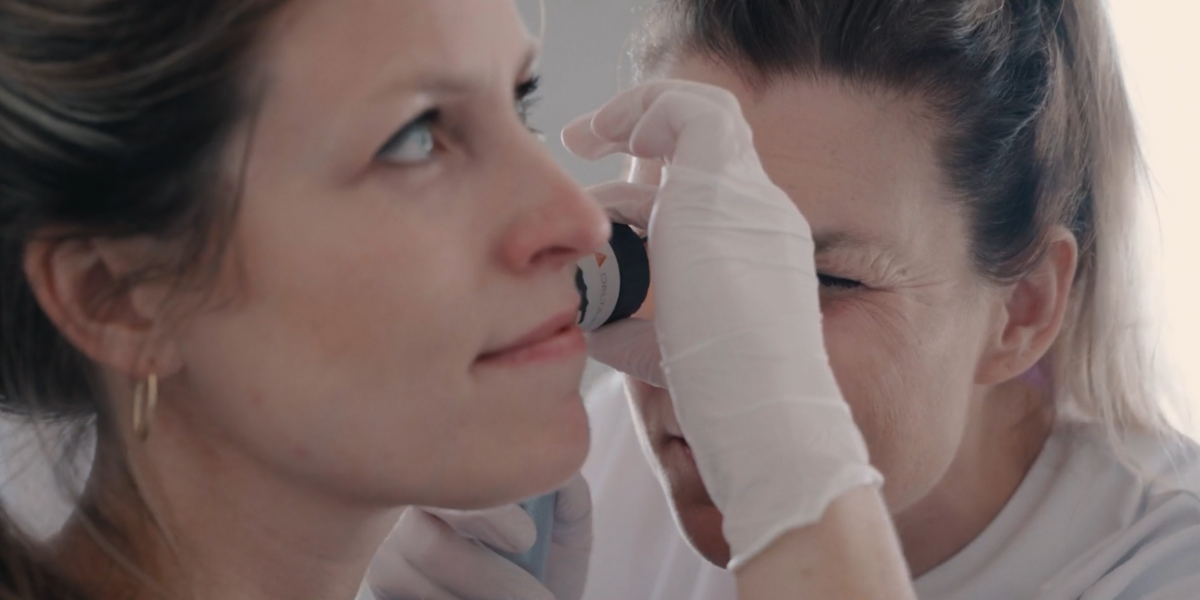Embedding enhanced risk signaling and secondary prevention in skin therapeutic care
Cancer is one of the diseases that cause the highest burden of disease. Skin cancer is the most common form of cancer in the Netherlands. There are more and more new skin cancer patients. Meanwhile, the affordability and availability of healthcare is under increasing pressure. That pressure can possibly be reduced if general practitioners and paramedics are better trained in recognizing suspicious skin abnormalities and using appropriate technology for this purpose. They may then be able to help specialists diagnose skin cancer more quickly. If training helps to reduce unnecessary referrals, the patient journey will also improve.
The goals of this project are:
- To identify skin parameters that are a preclinical skin therapeutic predictor of underlying problems
- Mapping the wishes and needs of skin care clients with preclinical skin therapeutic predictors for underlying problems
- Establish appropriate, inclusive measurement protocols for measuring these skin parameters.
- Determining appropriate, inclusive reference values for these skin parameters needed to identify underlying problems
- Secondary prevention (better identification of suspicious abnormalities of the skin and appendages and, upon identification, more effective referral of apparently asymptomatic patients who have already developed risk factors or preclinical signs of disease, but for whom the disease is not clear to the patient)
- Preventing unnecessarily long patient journeys and unnecessarily late diagnosis of underlying problems that are detrimental to the health and quality of life of patients.
- Optimizing primary care with regard to early identification of risks related to underlying problems and choosing appropriate follow-up actions such as referral
Preliminary findings
The lectorate is about to publish a study into the recognition of pigmented skin lesions by general practitioners and skin therapists. The research clarifies whether they benefit from a training program aimed at recognizing different pigmented skin lesions. This involves both the ability to distinguish between different forms of pigmented skin lesions and choosing appropriate follow-up actions after identifying a type of skin lesion. The research group carried out this research in collaboration with the Oncological Care research group and the Skin Therapy program of The Hague University of Applied Sciences (THUAS) and with the Dermatology department of the Leiden University Medical Center (LUMC).
Ongoing research and follow-up research
The lectorate also conducts research in which the recognition of suspicious skin lesions by second-line skin therapists is compared with the recognition by dermatologists. Skin therapists assess the lesions based on the clinical picture and dermatoscopy. This assessment is then compared to the diagnosis of the dermatologist. This research is being carried out in collaboration with the Oncological Care research group, Skin Therapy department of THUAS and the Dermatology departments of the LUMC and the Netherlands Cancer Institute (NKL) / Antonie van Leeuwenhoek Hospital (AvL).
Follow-up research by the lectorate into the accuracy of estimation will investigate how improving the targeted mapping of skin cancer risks and the accurate assessment of suspicious skin lesions by first-line skin therapists can be improved. The lectorate is also looking at the effect of embedding a method for determining the risks of skin cancer in Electronic Patient File software (i.e. EPD-software). In the study, also the effect of the application of eHealth on the accuracy of the clinical assessment is investigated. The choices with respect to what eHealth to use, are tailored to the needs and preferences of patients, general practitioners and dermatologists. The research group is carrying out this research on behalf of the Dutch Association of Skin Therapists (NVH) together with the Oncological Care research group and the Skin Therapy program of The Hague University of Applied Sciences within a consortium that also consists of the Dermatology department of the Erasmus Medical Center, the Master Innovation in Care and Welfare program (MIZW) of Hogeschool Utrecht (HU) and participating skin therapy practices.
Based on the research results, the lectorate will also study more broadly in the future the necessity and possibility of improving the risk assessment with regard to other types of risks by first-line paramedics. For skin care, training courses have already been developed for skin therapists who participate in research to better use technology in order to improve data quality. The lectorate will offer the training courses in an adapted form to the professional field and the Skin Therapy course, in collaboration with the Dutch Association of Skin Therapists.
Website (in Dutch):
https://sites.google.com/view/huidzorg-innovatie-portaal/homepage


